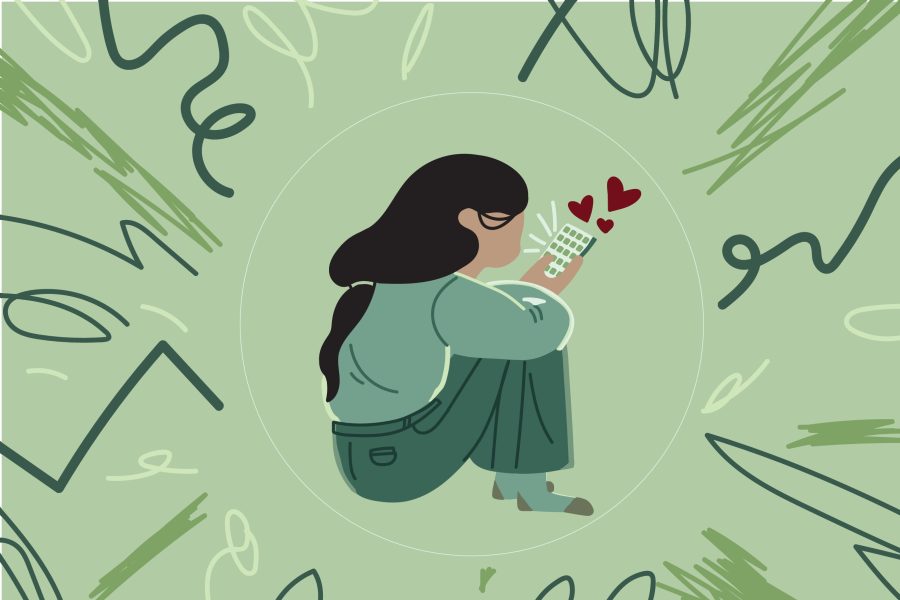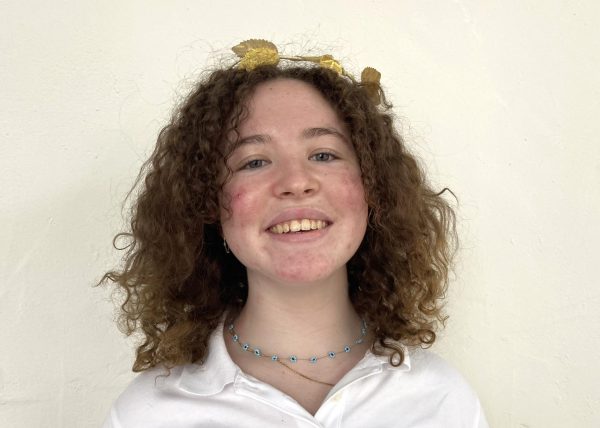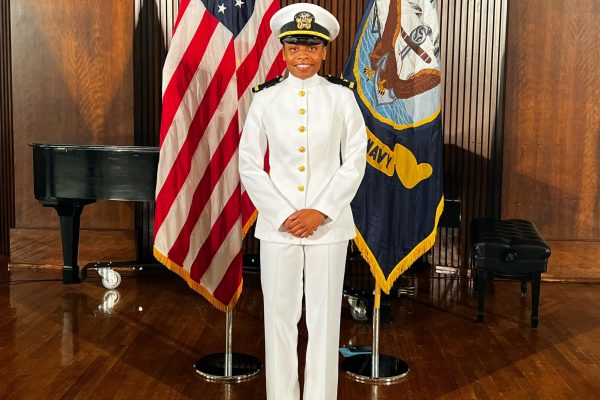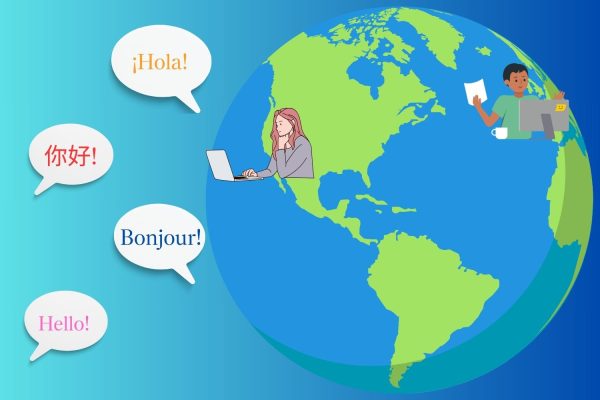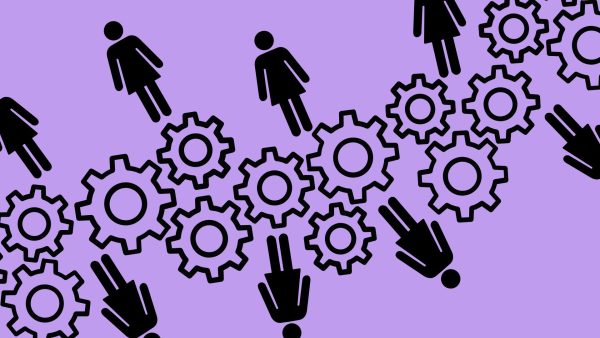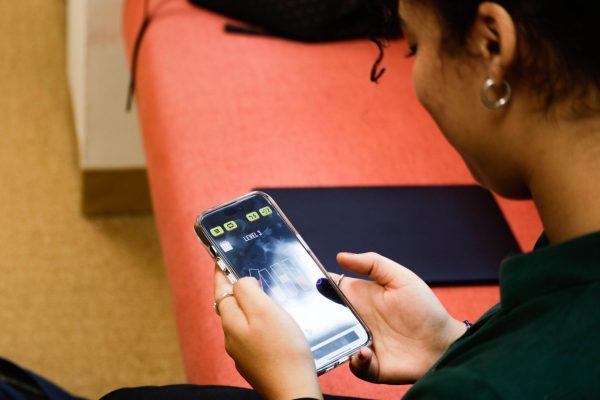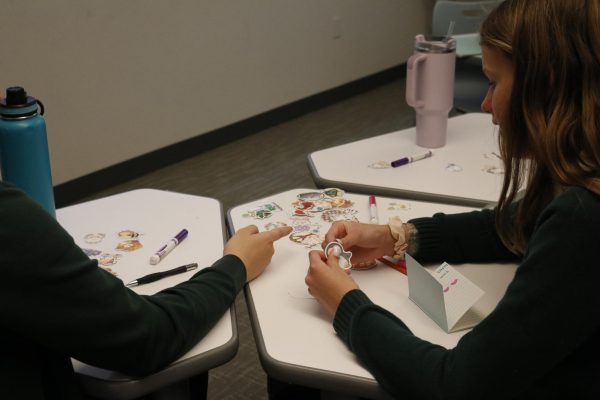Spotlight: Archer students provide support for teens in crisis through Teen Line
Photo credit: Sydney Frank
A girl sits alone, scrolling on her phone. Eight Archer students currently volunteer at Teen Line, a hotline for teens to reach out to other teens regarding mental health concerns. “If you don’t know what to do in a situation where your friend is in trouble or anyone in your life, then you can feel really helpless and powerless,” Francie Wallack (’25) said. “It can be really empowering to know what to do and know how to help yourself.” Graphic illustration by Sydney Frank
December 15, 2022
Content Warning: This article mentions suicide, self-harm, depression and anxiety. If you or anyone you know needs mental health support, reach out to Teen Line by calling 852-8336 or texting “TEEN” to 839863, if you are a teenager, or call 988 for the National Suicide Prevention Hotline.
In a classroom of 18 students, statistics suggest more than six are suffering from mental health issues. According to the CDC, more than one in three high school students experienced emotional health issues during the pandemic, and half of the surveyed students felt “persistently sad or hopeless.”
One of the ways students have been able to find support is through Teen Line. Teen Line is a hotline for teenagers to call, text or email other teenagers regarding their mental health experiences and to connect with them. The hotline is affiliated with Cedars Sinai Medical Center, and volunteers are required complete over 100 hours of training, which includes learning how to assist callers, completing role plays and answering texts before taking calls. Students at Archer have volunteered with Teen Line for years.
The eight Archer students who currently work at Teen Line all said they value mental health, especially after seeing close friends and family face challenges first hand or having personal mental health experiences, leading them to volunteer. Francie Wallack (’25), Remi Cannon (’24), Lila Paschall (’24), Kennedy Schultz (’23), Cara Banks (’23), Lexie Horizon (’23), Lily Prokop (’23) and Avery Weingarten (’23) all spend their four-hour shifts taking calls or answering texts.
Horizon was diagnosed with anxiety when she was younger, and she joined Teen Line in 2020. She takes calls from other teenagers grappling with a variety of difficult situations, such as self-harm, suicide, depression and anxiety. She said she joined because she wanted to provide resources for teenagers who don’t have access to the same resources she did, such as therapy sessions or empathetic peers.
“Being a teenager is hard. There’s a lot of social challenges, school pressure — there’s so many different things going on,” Horizon said. “I also think teen mental health, in general, is something that’s always been an issue, but it’s just becoming more accepted to talk about.”
Wallack is an observer, answering texts but still training to take calls. She said educating yourself about emotional health can be empowering because people don’t have to struggle in silence. She said the more you talk about and educate yourself about emotional health, the more it becomes normalized and people will see they are not alone.
“Mental health is just so under talked about, and people really don’t know how to reach out for help. I just wanted to bridge that gap and be there for people when they needed it,” Wallack said. “In the past, I’ve struggled with my mental health, so I wanted to be that person for someone else that was [there] for me.”
Suicide is currently one of the leading causes of death among 10-24 year olds in the U.S. More than six million teenagers have anxiety, depression and ADHD. According to the New York Times, 30 years ago, the biggest teen health issues were intoxicated driving, binge drinking, smoking and teen pregnancy. Now, those issues have been replaced by an alarming amount of serious psychological health disorders.
It’s totally okay to reach out for help to second parties and to ask your friends for resources…never be afraid to prioritize your mental health.
— Remi Cannon ('24)
Horizon and Cannon said that the number of calls to Teen Line have recently decreased, which they attribute to the opening of the 988 suicide hotline. However, Wallack has seen an increase in texts. Horizon and Cannon are required to use aliases when they receive calls for privacy reasons. Cannon finds that her shifts can be particularly emotionally challenging, and leaving her calls behind and transitioning back into her regular life can be difficult.
“You have to detach yourself from this sort of work or else you’ll be too emotionally drained … I’m currently struggling with [being] very in the moment with people I take calls from — we’re not allowed to give the callers, or anyone who reaches out advice, so I’ve been struggling to refocus my intentions to giving resources,” Cannon said. “I’m more involved in the conversation part, [so] I think it’s hard to redirect yourself when this person is telling you such personal information. Then you [have] to be like, ‘Oh, well, there’s this really cool website or this article I think you should read’ and end the conversation there.”
Although Wallack does not take calls yet, she said texting under such serious circumstances creates challenges.
“Texting can sometimes be a little harder. Since you’re not actually talking to them, there’s that barrier of just typing instead of being able to just have an ongoing conversation, because people will put their phones down and they’ll walk away,” Wallack said. “So in that moment of silence, it’s just really hard because you’re like, ‘What are they doing right now?’ It’s kind of scary in those moments.”
Cannon and Horizon emphasized the importance of erasing psychological health stigma by sharing individual experiences. Before joining, Cannon was once on the other side of the helpline, reaching out over text for support through a challenging moment. After finding the help she needed, it sparked a desire for her to do the same for others and normalize reaching out for others.
“Personally, when I was in middle school, I had a really hard time just admitting to myself I need interference, I need someone else to help me. It’s really hard to come to that conclusion,” Cannon said. “We can destigmatize receiving help, either from an adult therapist or reaching out to help lines, such as Teen Line. It’s totally okay to reach out for help to second parties and to ask your friends for resources … Never be afraid to prioritize your mental health.”
Although many teens in the U.S. are still managing psychological health issues, Horizon said she appreciates increasing access to places like Teen Line, where they can get the support they need.
“It makes me happy to know that people have the courage and there’s a space to talk about what people are going through,” Horizon said. “Part of the reason I do Teen Line is because mental health is so stigmatized. Being in a place where I can openly talk or help people who are willing to call — it’s definitely a special opportunity.”





![Freshman Milan Earl and sophomore Lucy Kaplan sit with their grandparents at Archer’s annual Grandparents and Special Friends Day Friday, March 15. The event took place over three 75-minute sessions. “[I hope my grandparents] gain an understanding about what I do, Kaplan said, because I know they ask a lot of questions and can sort of see what I do in school and what the experience is like to be here.](https://archeroracle.org/wp-content/uploads/2024/03/grandparents-day-option-2-1200x800.jpg)














































